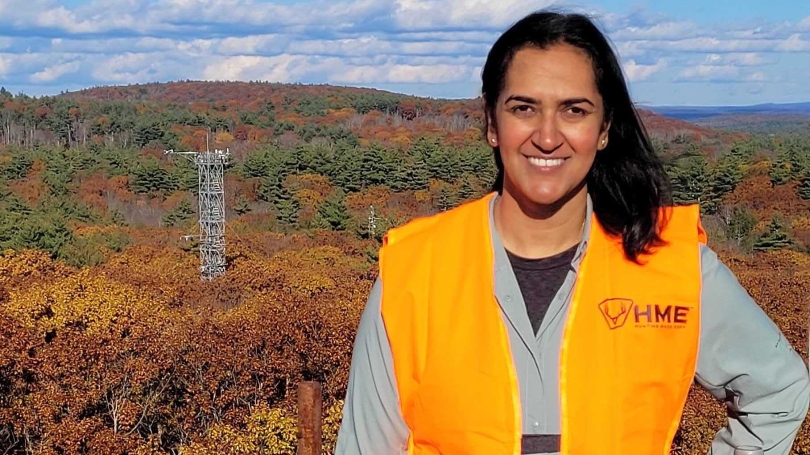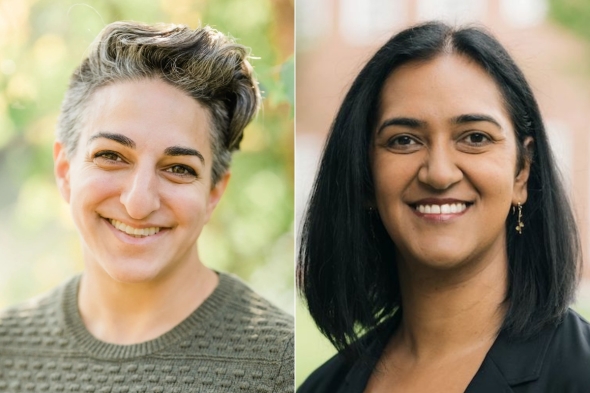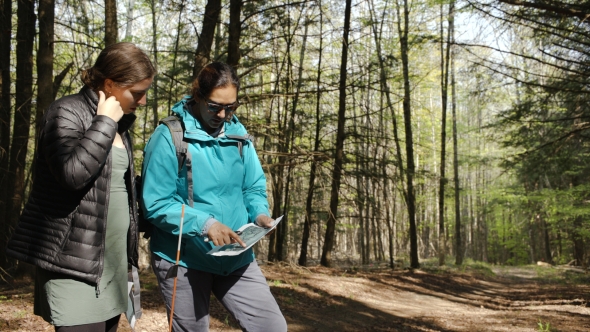When ecologist Lily Khadempour was preparing to start her first faculty position in January of 2021, she sought to form her own mentorship network.
"It was then that I realized that every single person that filled every mentorship role for me was white," recalls Khadempour, an assistant professor at Rutgers University-Newark who holds Iranian citizenship and identifies as a person of color. "I longed to have a woman of color mentor."
Less than a year earlier, Khadempour had discovered and joined an online community launched by professor and fellow ecologist Bala Chaudhary called Women of Color and Non-Binary People of Color in Ecology and Evolutionary Biology and known affectionately as "WOCinEEB."
"Many of us women of color are often 'the only' in our departments," says Chaudhary, now an associate professor of environmental studies. "It can sometimes be difficult to have frank discussions about racism and misogyny with our colleagues. We were looking for an affinity space where we could be people of color and discuss issues that were important to us."
Women scientists of color have long been underrepresented at academic institutions, especially in full professor ranks. According to 2015 National Science Foundation data on science, health, and engineering doctorates, Black/African American, Latina, and Native women accounted for less than 1% of full professors, less than 2.5% of associate professors, and less than 3% of assistant professors.
"Women of color as well as non-binary and transgender people of color are conspicuously absent across both academia and environmental organizations, especially in leadership roles," Chaudhary says. "The environmental sciences lag behind many other STEM disciplines with respect to racial and ethnic diversity."
Buoyed by the camaraderie she found among her peers, Khadempour teamed up with Chaudhary to launch one-to-one and peer-group mentorship programs as part of the growing community. In just a year, the group grew to encompass over 400 members and more than 200 mentor-mentee pairs.
This past June, Chaudhary and Khadempour received an NSF grant to strengthen and expand the mentorship program with academic career advancement webinars and a conference designed to strengthen scientific networks and build interdisciplinary collaborations across ecology, evolution, environmental microbiology, the geosciences, and atmospheric and marine sciences.
The grant enables Chenyang Su, a doctoral student in the Ecology, Evolution, Environment and Society program, to help organize the group's first conference, which will take place July 25–27 at Dartmouth.
"When you start progressing in your career and you're a woman of color, you increasingly hear from younger colleagues searching for help and mentorship," Chaudhary says. "As our online community grew, I realized just how many of us there are who can offer knowledge and expertise. I love to create networks—we're basically creating an efficient way to channel the mentorship that many of us were already doing."
A growing community 'lifts each other up'
The WOC group began "slow and small" as a Slack channel that Chaudhary launched in the fall of 2020.
As the world grappled with the COVID-19 pandemic, the murder of George Floyd and global racial reckoning, and the deeply polarized presidential election, more scientists of all ranks joined the group.
"We knew we needed a place where we could lift each other up," Chaudhary says. "From sharing jobs and successes to finding resources, it's been a powerful way to connect online for a community that is often very disjointed in academia."
Khadempour joined the group after she saw it advertised on Twitter and immediately felt a sense of belonging. "All the informal mentorship and community building that happens in the Slack has been beautiful to be a part of," she says.
Chaudhary recalls seeing a small learning community form when several members realized that they were applying for the same grant.
"Instead of seeing each other as competitors, they decided to work together," Chaudhary says. "I'm tearing up because it's such a beautiful use of this space and a feeling of community and camaraderie that you don't see often."
Chaudhary also values offering a dedicated space for celebrating successes.
"Often, when women and people of color share successes, they are met with an attitude of, 'Oh, you got that because of your minoritized identity, or you're an affirmative action case, so no wonder you got that,'" she says. "The result is that we're less willing to share and we will keep our successes to ourselves, with no time or space to celebrate it."
Successes in the group are often met with hundreds of emojis, she says. "We all chime in wishing each other congrats, and it's just such a wonderful, safe space to share successes."
Modeling pathways
Once the platform took off, members began to request more formalized mentorship opportunities.
"Lily took on the task of organizing one-on-one mentoring relationships, and also peer mentoring groups that serve hundreds of women," Chaudhary says.
Christine Sit, an early-career professional in the environmental field, also supports the group's mentoring programs. Unlike many similar programs, the group offers one-to-one and peer-group mentorship options for women in STEM of all ranks—from undergraduate students to tenured professors.
Khadempour's mentor, a senior colleague in ecology, inspired her to pursue a new line of research. "Her encouragement and the fact that she was a wise and experienced voice really pushed me to take risks I would not have taken otherwise," she says.
Every mentor and mentee fill out a mentorship agreement form that lays out the expectations for each mentorship relationship. One hour per month is a typical parameter, Khadempour says—"not a big ask for the mentors, considering the positive aspects that it brings."
Khadempour also values taking part in a peer group. "It's just been so wonderful to find people in the same career stage and move through our careers together."
Chaudhary has mentored two postdoctoral scholars through the program, helping them successfully navigate the negotiation process for faculty positions.
"Negotiations for faculty positions are so stressful, and no one teaches you how to do it," Chaudhary says. "Women are often encouraged to be bold, but then we're punished for being bold. I helped my mentees negotiate in a way that they get what they want, while building relationships with their new colleagues."
For Khadempour and Chaudhary, offering "culturally appropriate" mentorship is key.
"It's really about mentoring in a way that recognizes who people are and how their past experiences shape them and their science work environments," Khadempour says.
Testimonials from participants reinforce the need for mentorship opportunities designed to support women of color.
"My mentoring experiences have been really helpful and are some of the few professional interactions that I can rely on for safe space," says biologist Grace Smith-Vidaurre, who will join the faculty of Michigan State University in 2024. "WOCinEEB makes me feel hopeful about the future, both for the eco-evo field and my career in it."
Strengthening science
A 2020 study found that although underrepresented scholars in science-related fields are more likely to innovate, they're also less likely than their majority-group peers to earn influential academic positions. The authors ask: Which trailblazers has science missed out on as a consequence?
The climate crisis, whose impacts and adverse effects require an interdisciplinary scientific approach, only exacerbates the need for innovation and inclusivity.
In addition to supporting networking and mentorship programs, Chaudhary and Khadempour's NSF grant will support them in fostering new interdisciplinary scientific collaborations.
"When our members get together, we usually talk about diversifying STEM, and we often never get to just sit around and talk about science," says Chaudhary, whose lab at Dartmouth focuses on mycorrhizal ecology. "A big part of the NSF grant is bringing women of color together to catalyze new science collaborations."
This July 25-27, Dartmouth will host the group's first in-person conference. Breakout sessions will explore interdisciplinary and transdisciplinary collaborations within and across ecology, evolution, microbiology, geosciences, atmospheric, and marine sciences, as well as building a collective vision for making leadership in the environmental sciences a more inclusive space.
The conference will also include a public panel discussion on July 26 featuring women of color professors who are successful environmental scientists as well as experts in promoting DEI in STEM. The panelists will describe barriers and support they have experienced on the road to becoming leaders in STEM. Students, postdoctoral researchers, and other trainees are particularly encouraged to attend. (This is a hybrid event comprising an in-person panel and audience, with the option to attend remotely. Participants wishing to participate online should register to receive a zoom link.)
The panel discussion is supported by the Dartmouth Fannie and Alan Leslie Dartmouth Conference Fund, the National Science Foundation, and the WOC group.
"We are all just so excited to bring our true selves to science and form new science collaborations," Chaudhary says.


